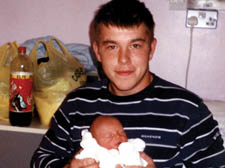|
|
 |
| |
 Ralph Kennedy pictured after the birth of his son Ralph Kennedy pictured after the birth of his son |
Two other shocks at the spot which claimed life
Community support officer electrocuted on same days as tragedy
A SPECIAL police officer survived an electric shock on the same council estate where a scaffolder died from being electrocuted, the New Journal can reveal.
Police and the Health and Safety Executive investigating the death of father-of-two Ralph Kennedy are understood to be looking at how many other people came into contact with a faulty light fitting.
Mr Kennedy, 24, popularly known as Barney, died last Friday after being electrocuted at the Mayford estate where he was working on refurbishment works.
A worker on the site has also claimed that a colleague was electrocuted at the same place several days before Mr Kennedy’s fatal shock.
It is understood the 46-year-old police community support officer (PCSO) was injured at the same spot the day Mr Kennedy died. The shock, however, was not as strong and left the officer with just a sore shoulder.
Mr Kennedy’s funeral will take place at St Dominic’s Priory in Southampton Road, Gospel Oak today (Thursday) at 9am.
Mr Kennedy’s aunt, who did not want to be named, said she had been told by detectives that they are confident those responsible for Mr Kennedy’s death will be held to account.
She added: “We think we’ll get the answers we want. Although this is a difficult time we just want to thank the police and staff at the coroners’ court. They’ve been very helpful and have supported us all the time – they haven’t kept anything from us.”
Neighbours claim workers investigating the electrics on the estate told them the light fitting was between 17 and 18 years old. They added that the results of the investigation could be wide-reaching, possibly affecting all London boroughs and had been told the council was reviewing its health and safety procedures on construction sites as a result of Mr Kennedy’s death.
Meanwhile, the nationwide Construction Safety Campaign has pledged to also look into the tragedy, arguing yesterday (Wednesday) that not enough checks are completed.
Secretary Tony O’Brien said: “Councils across London have a lot to answer for. There was a time when Camden had a large in-house construction team, not any more.
“If they had, they could make sure everybody on site was properly trained.
“They also would check the sites more often. They need to be checked on a daily basis by both the council and the contractor. In this case, it looks like this wasn’t done because the problem would have been spotted – especially if there had been complaints about it sparking beforehand. The area should have been cordoned off. These things wouldn’t happen if there was a direct in-house team. ”
He added: “There is a culture to hush things up when things like this happen. There needs to be more honesty. The family are not invisible people. They deserve to be told what happened. The trouble is safety costs and people don’t like spending money – but a daily check should be a standard procedure.”
Mr O’Brien invited all of construction workers from Camden to a public meeting about safety at the end of November.
A council press official said: “The investigation into this tragic death has just started and it is important that we, the police and the Health and Safety Executive conduct a thorough investigation, which we hope will be done as quickly as possible for his family and all those who knew and cared about him, as well as the residents of the Mayford Estate.
“We will not know these answers until the investigation is completed and will keep the family fully informed throughout.”
Requests by the New Journal to speak to John Newby, the chief executive of the company in charge of the site, Gee Construction, were rejected. One woman at the firm said: “Mr Newby doesn’t take these kind of calls, he only deals with business. He employs us menials to answer his questions – he won’t accept the call. He’s not responsible for the accident of this poor chap.
“We (Gee Head Office) have been told not to say anything – we were not not involved in the situation. We were not privy to the goings on there, we were not there.” |
| |
|
 |
|